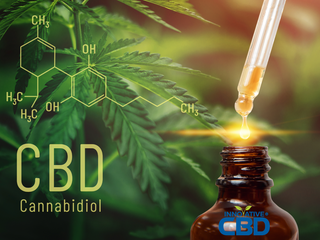Have you wondered about the real benefits and uses of CBD oil? As more people explore plant-based wellness, they're asking, "What is CBD oil?" and how can it genuinely support their health goals. At Innovative CBD, we believe in providing clear, approachable information you can trust. Understanding its potential applications is the first step toward enhancing your daily wellness with confidence.
What is CBD Oil?
CBD, or cannabidiol, is a naturally occurring compound found in the hemp plant (Cannabis sativa). Unlike THC, CBD does not cause intoxication or produce a "high."
Benefits and Uses of CBD Oil
CBD oil is often chosen by consumers looking to complement their wellness routines with natural, plant-based options. While ongoing research continues, here are some neutral, legal, and informational benefits that CBD oil may offer as part of a healthy lifestyle:
| Benefit | Description |
|---|---|
| Promotes Daily Wellness Routines | Many users incorporate CBD as a daily ritual to support balance and calm. |
| Non-Intoxicating & THC-Free Options | Broad-spectrum and isolate products offer zero THC while still offering CBD. |
| Customizable Usage Methods | Available as oils, capsules, topicals, or edibles—allowing flexibility in use. |
| Plant-Based & Naturally Derived | Extracted from organically grown hemp, CBD appeals to eco-conscious consumers. |
| Easily Integrated into Lifestyle | Can be added to food, drinks, or skincare, or used as a standalone supplement. |
How Is CBD Oil Made?
The quality and effectiveness of CBD oil can vary based on the extraction method used. Here's a breakdown of the most common methods:
Extraction Methods Overview
| Method | Description | Common Use Case |
|---|---|---|
| CO₂ Extraction | Uses pressurized carbon dioxide to extract CBD cleanly and efficiently | Premium CBD products |
| Ethanol Extraction | Uses food-grade alcohol to extract cannabinoids | Broad-market products |
| Oil Infusion | Traditional method using carrier oils and heat | DIY or small-batch infusions |
| ISPMP Method | Unique, solvent-free process that preserves essential compounds. | Innovative CBD professional-grade products |
The Innovative CBD Difference
At Innovative CBD, we set a higher standard with our founder's unique extraction method, called Innovative Synergistically Present Molecular Preservation (ISPMP). While many brands use CO2 extraction, which can lead to excessive refinement and the loss of important compounds, our distinct, solvent-free process is different.
The ISPMP method avoids the high temperatures and harsh chemicals that can strip away beneficial compounds like CBDa, terpenes, and other phytonutrients. By preserving these elements, we maintain the plant's natural integrity and capture its full potential, resulting in a superior, more effective CBD oil.
Types of CBD Oil Products
CBD oil comes in various formulations to meet diverse consumer needs.
Comparison of CBD Types
| Type | Contains THC | Other Cannabinoids | Best For |
|---|---|---|---|
| Full-Spectrum | ≤0.3% (legal) | Yes | Users seeking the entourage effect |
| Broad-Spectrum | 0% | Yes | THC-free option with cannabinoids |
| Isolate | 0% | No | Pure CBD for sensitive users |
Legal Insights: Is CBD Oil Legal in the US?
As of the 2018 Farm Bill, hemp-derived CBD products containing no more than 0.3% THC are legal at the federal level. However, state laws vary, and some regions restrict sales or specific uses.
How to Use CBD Oil
There are several ways to incorporate CBD oil into your routine, depending on your preferences and product type.
Common Methods of Use:
-
Sublingual (Under the Tongue): Allows fast absorption through mucous membranes.
-
Capsules or Edibles: Pre-measured and convenient.
-
Topical Application: For targeted external use.
-
Vaping (Specialized Products Only): Fast-acting, but not all oils are vape-safe.
Tips for Buying High-Quality CBD Oil
-
Look for Third-Party Lab Reports – These verify the cannabinoid profile and purity.
-
Check for Organic Hemp Sources – US-grown, organic hemp ensures better quality.
-
Read Labels Carefully – Confirm ingredients, carrier oils, and THC content.
-
Avoid Overpromising Brands – Be cautious of claims like "CBD cures…" as these are not FDA-approved.
How to Store CBD Oil?
-
Keep it in a cool, dark place away from direct sunlight.
-
Seal tightly after each use to preserve potency.
-
Shelf life typically ranges from 12 to 24 months, depending on ingredients.
Making an Informed Decision
When reviewing the benefits and uses of CBD oil, you can see that it offers a range of lifestyle benefits when used responsibly and legally. From wellness routines to pet care and skincare, CBD has found its place in the American consumer market. As more research emerges, it's crucial to rely on high-quality products, accurate information, and legal compliance when exploring CBD.
Ready to learn more?
Explore our educational resources or browse our collection of lab-tested CBD oils and products, crafted with transparency and quality in mind.
Frequently Asked Questions
Q: Is CBD legal in all US states?
A: CBD derived from hemp (≤0.3% THC) is federally legal, but state laws may vary. Check your local regulations.
Q: What is the difference between full-spectrum and isolate CBD?
A: Full-spectrum contains multiple cannabinoids (including trace THC), while the isolate is pure CBD with no other cannabinoids.
Q: Can I travel with CBD across state lines?
A: Generally, yes, if it's hemp-derived and contains ≤0.3% THC, but always verify destination laws.
Q: How do I know if a CBD product is third-party tested?
A: Look for a Certificate of Analysis (COA) from an independent lab, often available on the brand's website.
Q: Will CBD get me high?
A: No. CBD is non-intoxicating and does not produce a "high" like THC.
Disclaimers: The Food and Drug Administration (FDA) has not evaluated these statements. CBD products do not treat, cure, or prevent any disease. Consult a healthcare provider before using any CBD products, especially if pregnant, nursing, or taking medications. All content is for informational purposes only and should not be considered medical advice.


